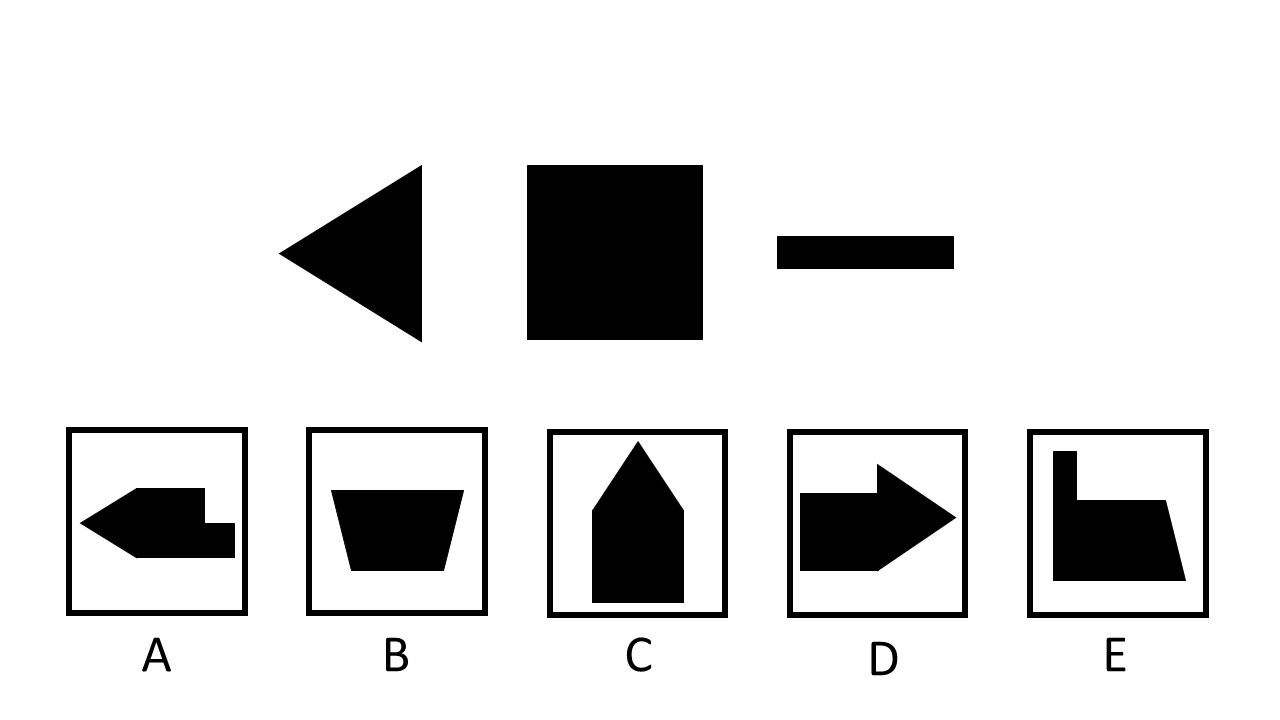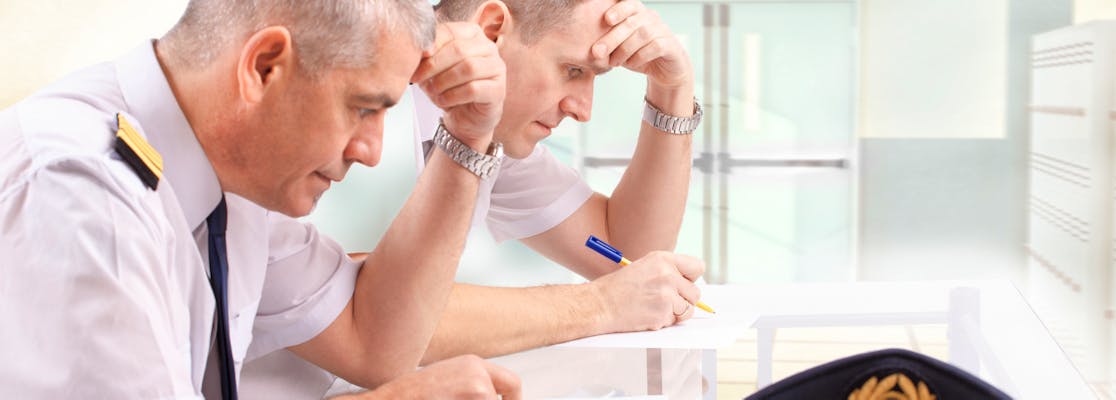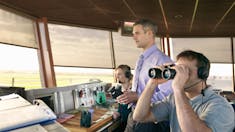Pilot Aptitude Tests in 2025: Pilot Assessment Guide
All products and services featured are independently selected by WikiJob. When you register or purchase through links on this page, we may earn a commission.
- A List of Pilot Aptitude Tests Available for Practicing in 2025
- What Are Pilot Aptitude Tests?
- Are Pilot Aptitude Tests Only for Commercial Pilots?
- The Skills Assessed by Pilot Aptitude Tests
- What to Expect From Your Pilot Aptitude Test in 2025
empty
empty
empty
empty
- How to Prepare for a Pilot Aptitude Test in 2025
- Frequently Asked Questions
- Final Thoughts
A List of Pilot Aptitude Tests Available for Practicing in 2025
- Pilot Aptitude Test
- Qantas SHL Pilots Aptitude Test
- cut-e Airline Pilot Test
- British Airways Online Assessment
- easyJet Cut-e-style Pilot PrepPack
- Ryanair Pilot Assessment
- Delta Assessment Test
Airbus has projected that the industry will need over 500,000 new pilots in the next twenty years. However, the competition will remain fierce, so you need to make sure you are well prepared for the pilot test.
This article will reveal what to expect from a pilot aptitude test and how to prepare for and practice the pilot test questions.
What Are Pilot Aptitude Tests?
Simply put, pilot aptitude tests are a way for airlines to filter through potential candidates to find those who are most likely to succeed through the training and development programmes.
Flight school training can cost more than £100,000 (even more if you have no prior flight experience), so it’s vital that airlines feel confident that they have a robust selection process.
A pilot aptitude test isn’t about your flight experience or your knowledge of how to fly an aircraft. It’s about testing a potential candidate’s aptitude, potential and ability to work under pressure.
Those who score highly on pilot aptitude tests will be highly sought after by airlines looking to invest in a new generation of pilots. If you do well on your pilot assessment test, the airline may subsidise your flight school training.
Are Pilot Aptitude Tests Only for Commercial Pilots?
If you are serious about becoming a pilot, you will likely need to take a pilot aptitude test, regardless of whether you plan to become a commercial airline pilot, a freight pilot or even a member of the RAF.
As flying is such a competitive field, you must prepare for and score highly on the pilot assessment test to give yourself opportunities for greater flexibility and employability.
The Skills Assessed by Pilot Aptitude Tests
With so many different pilot aptitude tests available, it can be difficult to know exactly what examiners are looking for.
A pilot aptitude test is a form of psychometric testing that allows potential employers to assess the key skills required to be a pilot.
These might include:
- Reasoning
- Literacy
- Numeracy
- How you react under pressure
- Spatial and situational awareness
- Hand to eye coordination
- Long-term memory
- Multi-tasking
Looking to take pilot practice tests? Check out this package from JobTestPrep.
Take a Free Pilot Aptitude Test
What to Expect From Your Pilot Aptitude Test in 2025
There is a wide variety of pilot aptitude tests available. Some of the most common include:
- Cut-e
- PILAPT
- COMPASS
- Advanced COMPASS
- Talent Q
Each airline uses its own criteria, so during your preparation, you may find a wide range of potential pilot test practice questions.
However, you can feel confident that the pilot test practice covered below will be included in your chosen pilot aptitude test.
1. Pilot Assessment Cognition Testing
This is where you’ll likely be tested on your cognitive functionality, most notably through numbers and reading.
-
Numerical Reasoning. Pilots need to accurately understand and interpret data, so you will be tested on your numerical and analytical reasoning skills. Information may be in charts, graphs or tables; you will be expected to answer questions based on the data provided.
Some airlines will add time pressure to the numerical reasoning section of the pilot aptitude test, so you will need to ensure that you have allocated enough time to complete as much of the test as possible.
In some scenarios, different questions may have different weighting – so it’s important to read the questions thoroughly and work out which ones merit spending more time on.
-
Verbal Reasoning. Pilots need to excel at communication. Therefore, the verbal reasoning section will explore your English language skills. Like most such tests, you will be expected to read a paragraph or statement and answer questions based on that text. Often questions may be posed as true or false, or you will need to determine which statement is correct based upon the text.
-
Perceptual and Spatial Awareness. Another key part of the testing process will be monitoring your perception and spatial awareness. You may have to look at a series of patterns, shapes or colours and find the odd one out or the next in the sequence. Or you could be asked to play a 3D pursuit game that assesses your spatial awareness, or take memory tests.
Practice Pilot Aptitude Test with JobTestPrep
British Airways is selling tickets from London to New York. It has sold 40% of the available tickets and still has 420 tickets available to sell. How many tickets were originally available on this flight?
a) 700
b) 535
c) 380
d) 420
Which image can be made from the three shapes shown?

If you need to prepare for a number of different employment tests and want to outsmart the competition, choose a Premium Membership from JobTestPrep.
You will get access to three PrepPacks of your choice, from a database that covers all the major test providers and employers and tailored profession packs.
Read the passage below and then decide if the statement is true, false or cannot say.
“The first successful aeroplane flight was made by Orville and Wilbur Wright, also known as the Wright brothers, in 1903. This plane was made of spruce wood, a favourite of the brothers. They were also responsible for inventing various control systems that helped pilots steer and control the aircraft.
"The three-axis control system was the most important of their designs and is still used today. Although planes are now mostly made of aluminium, the technical advancements made by the Wright brothers revolutionised the 20th Century and beyond.”
Aircraft are built in the same way as they were in 1903
a) True
b) False
c) Cannot say

2. Pilot Assessment Psychomotor Testing
This is where you’ll be tested on your hand-to-eye coordination. You could be asked to complete a task using a joystick, which will track your movement and reaction times.
You may also have to focus on two simultaneous tasks so examiners can see how you react to multiple situations, much like pilots have to do for real.
3. Pilot Assessment Physics Knowledge
Another core part of the pilot aptitude test is to assess your knowledge of basic physics.
As a pilot, you will need to understand space, time, movement and force – it is after all the driving function of how the aeroplane works.
Example Question:
Which is NOT a force?
a) Gravity
b) Thrust
c) Heat
d) Air resistance
e) Magnetic
4. Pilot Assessment Aviation Knowledge
A final part of the pilot aptitude test may comprise of some general questions relating to the aviation field. You will probably also face these types of questions in your pilot’s interview.
In a competitive environment, examiners are looking for those who show a passion and commitment to the aviation industry. Common subjects include law, aerodynamics and aircraft instrumentation.
Example Question:
Which code is used when two-way radio communication is lost?
a) Code 1555
b) Code 7600
c) Code 7511
d) Code 9587
e) Code 6744
How to Prepare for a Pilot Aptitude Test in 2025
If you’re keen to start your career as a pilot and you feel that you’re ready to take the pilot aptitude test, then you can book a test through organisations such as The Honorable Company of Air Pilots.
You may also wish to look at the websites of British Airways, Virgin Atlantic or the RAF, to see what they say about taking the pilot aptitude test.
There are numerous resources online which will help you to prepare in full for the pilot aptitude test.
Here are a few practical tips which may help you ace the pilot test on your first try:
Step 1. Study Hard
When it comes to the pilot aptitude test, those who score highly will be the most employable.
Because it is a competitive job market, the big airlines can choose the pick of the crop and will pay salaries accordingly.
Step 2. Check What Type of Aptitude Test You Are Taking
Each airline will likely use a different testing platform. Therefore, if you have a specific career path in mind, it’s worthwhile researching your preferred airlines pilot test and focusing your preparation efforts on their specific requirements.
It may help to focus your mind and allow you to get a much higher score on your pilot assessment.
Step 3. Use an Online Pilot Test
There are a variety of online pilot aptitude testing packs available that provide practice pilot aptitude tests.
Some pilot test practices will be available free of charge, whilst others (such as those from JobTestPrep) offer a paid-for service which will not only help you study but will offer pilot test practice questions, allowing you to monitor your progress.
Alternatives include the popular PilotAptitudeTest.com website. We recommend trialling a few different pilot test practice products and establishing what works best for you.
Step 4. Use WikiJob to Assist Your Study
WikiJob has a wide range of articles focusing on pilot aptitude tests, including numerical and verbal reasoning pilot assessments.
Before you start looking at specific questions, you should feel confident that you understand the format of these different tests.
As well as using our in-depth articles and making use of our wide range of free aptitude tests is a valuable tool to ask questions.
Take a Free Pilot Aptitude Test
The pilot aptitude test is a pre-employment screening assessment that is used to find candidates who are likely to succeed in a training program.
The pilot aptitude test is not about flying skills or knowledge of aviation; instead, it is an assessment of your potential, your thinking processes, natural aptitude, and most importantly how you perform under pressure.
Pilot aptitude tests are used as part of the application process for roles with commercial and freight airlines, as well as for military pilots.
As part of the pilot aptitude test, you will face several different types of psychometric tests, including:
- Logical Reasoning
- Numerical Reasoning
- Verbal Reasoning
- Spatial Awareness
- Memory
- Multi-tasking
- Mechanical Comprehension
- Hand-Eye Coordination
Several different publishers create pilot aptitude tests.
One of the most well-used is COMPASS. Both the standard COMPASS and the Advanced COMPASS test are used by major commercial airlines like Virgin Australia.
Another pilot aptitude test is PILAPT, which is used by both military and commercial flight operators throughout the world.
You might also face pilot aptitude tests created by popular test publishers like Cut-E and Talent Q.
As roles in flight schools and for training to become a pilot are so competitive, employers have the choice of applicants – which means that successful candidates need to prove they have what it takes to be successful.
The pre-employment screening of pilots through the pilot aptitude test is designed to be challenging so that only the best applicants can make it through.
For the most part, the content of the tests themselves is not all that hard. However, the pressure of a time limit and demonstrating the aptitudes that are needed against exam conditions make them hard to complete.
Knowing that you will have to not only pass the pilot test but also be compared against other test takers to be considered for a role as a pilot, it is in your best interests to get the very best score in all sections that you are capable of.
What this means in practice is that when you are preparing for the pilot aptitude test, make sure that you take all the opportunities to revise and practice so that you know what you need to do to score highly.
When you are facing a pilot aptitude test, it is likely to be as part of the application process for a training or cadet position (although sometimes they are used in experienced pilot applications too).
In either case, the pilot tests are a one-time thing, and you are not usually allowed to retake them during the application.
However, if the employer allows, you might be able to retake the pilot aptitude test if you reapply at a later date for the same position.
To make the most of the opportunity to score highly, you should revise and practice the sections of the aptitude tests, then you don’t need to worry about whether you are going to be able to retake the assessment.
The pilot aptitude test is designed to be a challenge so potential employers can pick the best applicants.
To give yourself the best chance for success, preparation is key. One of the most important ways you can be prepared is to take pilot practice tests, which will have several benefits for your performance in the real thing.
Firstly, dealing with pressure is one of the aptitudes that are being assessed in the test – and you can reduce the pressure off of yourself by getting familiar with the pilot test. Knowing what you are going to face when you sit down to complete the tests will make you feel more comfortable. You will also be able to recognize the structure and the layout and see what types of questions you are likely to face.
By taking the practice tests, you can also find out where you might need some extra revision. It is perfectly normal to have parts of the multi-faceted test that you are less comfortable in answering – and this is the perfect time to learn about your weaknesses. Use the responses to create a study plan and brush up where you need to.
When you are applying to an airline or another flight employer for a pilot role, you can often find resources for practicing the recruitment tests there. These are based on the questions that are used in the real assessment, so that is a great place to start your preparation.
The next place you should look for practice pilot aptitude tests is on the official website of the test publisher. The questions here are demonstrations of the real test, with similar content and test conditions.
For even more practice, and excellent revision resources, sites like Wikijob have example questions and lots of information available, or you can try the free (and paid) practice tests and Prep Packs at JobTestPrep.
Pilot aptitude tests are assessments of different skills, aptitudes and competencies that are as much about your ability to learn and be successful in training as they are about your potential to be a successful pilot.
In this way, the skills that are tested in pilot aptitude tests include:
- Logical thinking
- Numerical ability including mental arithmetic
- Spatial awareness
- Multi-tasking
- Long-term memory and recall
- Performance under pressure
- Hand-eye coordination
- Mechanical comprehension
- Reaction time
- Personality traits and behavior at work
- Accuracy
- Situational judgment
- Verbal ability
Final Thoughts
Pilot positions are becoming more accessible to candidates of all backgrounds. This article will help you be fully prepared for your pilot aptitude test.
Make sure you’re clear on what you need to study and do the maximum preparation before you book your final pilot test date. The more confident you are in your subject matter, the higher your final score will likely be.
Good luck.



